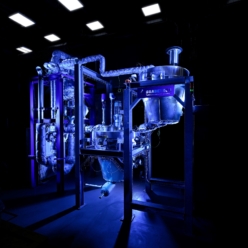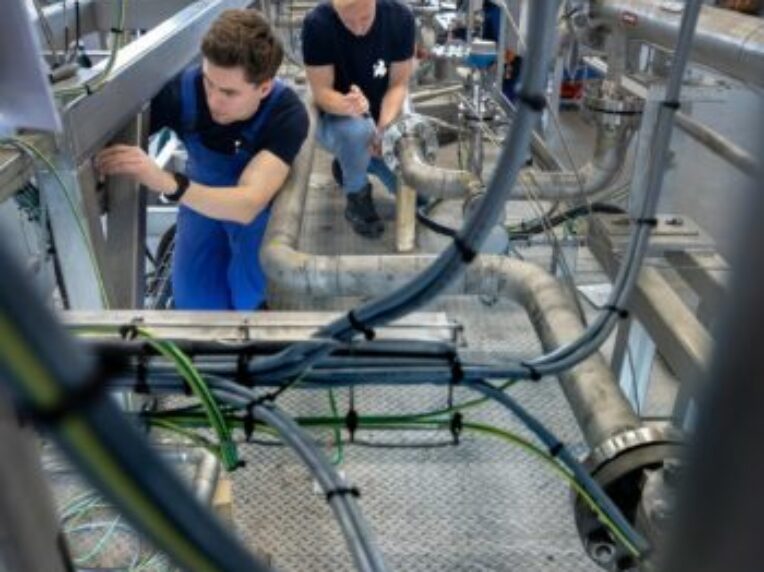Saltes
Saltes (formerly Brabetech) has a mission to contribute to the energy transition, with a specific focus on heat applications. Currently, as much as 55 percent of total energy consumption is attributed to heat, with the vast majority coming from gas-fired plants. However, given recent developments in gas prices and the growing need for sustainable heat, it is essential to develop new techniques for the efficient use of heat. One promising trend in this area is the use of electric heating. We are now on the cusp of a large-scale transition to renewable heat, in which Saltes intends to play an important role.
However, these new heat generation systems also require advanced heat storage and transfer technologies. Saltes is developing these systems for industry, based on the use of molten salt as a heat carrier. Molten salt offers the ability to store heat energy for a shorter period of time (up to about a week) and thus can handle peak loads using electric heating. Our technology has proven itself in several pilot projects over the past six years, and we are now ready to implement it on a large scale.
It is important to note that molten salt as a heat carrier is still relatively unknown to the general public. Traditional molten salts contain chlorides and have a melting point of 220 degrees Celsius. However, at Saltes we use a specific salt that does not contain chlorides and already works effectively at temperatures as low as 130 degrees Celsius, which significantly expands the application possibilities. We foresee promising applications for both small and large industrial heat consumers operating at temperatures between 150 and 500 degrees Celsius. Some examples are companies requiring heat within the combustion industry, food industry, recycling industry and chemical industry. In addition, combinations can also be made with renewable energy systems, such as concentrated solar power (CSP) or solar panels combined with electric heating, allowing a significant portion of the heat supply to be achieved in a fully sustainable manner. Here, molten salt can act as an alternative to thermal oil, where the system can be installed pressure-free and withstand higher temperatures than thermal oil.
Saltes is driven by its mission to contribute to the energy transition, with a specific focus on heat applications. Currently, an impressive 55 percent of total energy consumption is attributed to heat, predominantly derived from gas-fired installations. However, in light of recent developments in gas prices and the increasing demand for sustainable heat, it has become crucial to develop innovative technologies for efficient heat utilization. We are now on the verge of a large-scale transition to sustainable heat, in which Brabetech aims to play a significant role.
These new heat generation systems also require advanced technologies for heat storage and transfer. Saltes is developing these systems for the industry, based on the use of molten salt as a heat carrier. Molten salt provides the ability to store heat energy for a shorter period (up to approximately one week) and can thus accommodate peak loads when combined with electric heating. Our technology has been proven in various pilot projects over the past six years, and we are now ready to implement it on a large scale.
It is important to note that molten salt as a heat carrier is still relatively unknown to the general public. Traditional molten salts contain chlorides and have a melting point of 220 degrees Celsius. However, at Saltes, we use a specific salt that does not contain chlorides and is effective at temperatures starting from 130 degrees Celsius, which significantly expands the range of potential applicaitons. We foresee promising applications for both small and large industrial heat users operating at temperatures between 150 and 500 degrees Celsius. Examples include companies requiring heat in the combustion industry, food industry, recycling industry, and chemical industry. Additionally, combinations can be made with sustainable energy systems, such as concentrated solar power (CSP) or solar panels combined with electric heating, allowing a substantial portion of the heat supply to be realized in a fully sustainable manner. Molten salt can serve as an alternative to thermal oil, enabling the system to be installed pressure-free and to withstand higher temperatures than thermal oil.
Photos from Saltes

Saltes
High Tech Campus 27,
5656 AE,
Eindhoven
+31 850 027 782
Contact
Bram Bens
bram.bens@brabetech.nl






